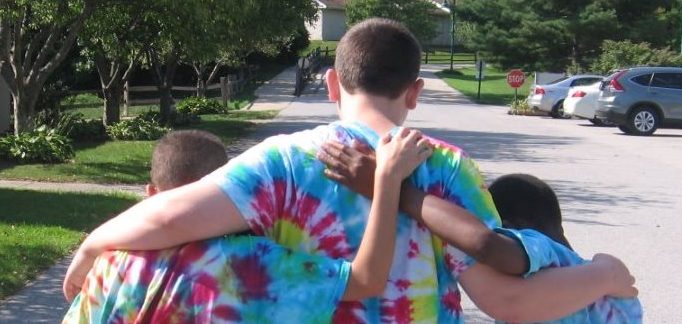Get Involved

 Become a Thought Partner
Become a Thought Partner
Partner with us to produce thought leadership that moves the needle on behavioral healthcare.
 Other options to get involved
Other options to get involved

Thank you!
We received your information and will be in contact soon!
Get Involved

 Grantmaking
Grantmaking
We fund organizations and projects which disrupt our current behavioral health space and create impact at the individual, organizational, and societal levels.
 Participatory Funds
Participatory Funds
Our participatory funds alter traditional grantmaking by shifting power
to impacted communities to direct resources and make funding decisions.
 Special Grant Programs
Special Grant Programs
We build public and private partnerships to administer grant dollars toward targeted programs.
 Program Related Investments
Program Related Investments
We provide funds at below-market interest rates that can be particularly useful to start, grow, or sustain a program, or when results cannot be achieved with grant dollars alone.
Get Involved

 Alyson Ferguson, MPH
Alyson Ferguson, MPH
Chief Operating Officer
Contact Alyson about grantmaking, program related investments, and the paper series.
 Samantha Matlin, PhD
Samantha Matlin, PhD
Senior Learning & Community Impact Consultant
Contact Samantha about program planning and evaluation consulting services.
 Caitlin O'Brien, MPH
Caitlin O'Brien, MPH
Director of Learning & Community Impact
Contact Caitlin about the Community Fund for Immigrant Wellness, the Annual Innovation Award, and trauma-informed programming.
 Joe Pyle, MA
Joe Pyle, MA
President
Contact Joe about partnership opportunities, thought leadership, and the Foundation’s property.
 Bridget Talone, MFA
Bridget Talone, MFA
Grants Manager for Learning and Community Impact
Add some text here

By: Kristen E.M. Gay, Ph.D., President/CEO, Silver Springs – Martin Luther School and Peter York, MSSA, Principal, BCT Partners
In February 2018, the Scattergood Foundation published “A New Way to Use Data,“ a case study of the application of machine learning to psychiatric residential treatment for children. This case study shared how Silver Springs launched a project using the residential treatment program’s administrative data and machine learning algorithms to more precisely match children to the most effective interventions. This analytic process, which is called Precision Care, is akin to precision medicine and is a data-driven approach to addressing problems that all clinicians have lived with since the dawn of research: just because something works for a group doesn’t mean it works for every individual. The first phase of the Precision Care project – described in the above-referenced paper – achieved three results:
-the matching of children into groups of similar cases based on shared common psychiatric challenges, histories, and backgrounds;
-the discovery of specific combinations of treatment that were most effective for each group and,
-a more precise evaluation of outcomes attributable to treatment received.
With support from the Scattergood Foundation and the City of Philadelphia’s Department of Behavioral Health and Intellectual disAbility Services (DBHIDS), Silver Springs engaged in a second phase of the project which improved the precision care model and developed a prototype software application to assist in the delivery of precision insights on-demand. Specifically, Silver Springs’ leaders, managers, and clinicians refined the Precision Care model by integrating new data to improve the model’s validity and usefulness. For example, during the first phase of the Precision Care project, there were no measures available of family involvement and engagement in treatment. In this second phase, data on family involvement was gathered and integrated through the involvement of clinicians, resulting in better insights. The first model was run using after-care data (obtained after children’s discharge from treatment), whereas in the second round of modeling, real-time treatment data was included. After this refining of the model, a prototype software application was developed that produces on-demand, case-specific predictive and prescriptive insights, as well as findings about the groups of children evaluated. This application now will provide clinicians and teams with information they can use to make more informed decisions about client treatment. These positive results have motivated Silver Springs to not only commit to integrating the Precision Care models and software application into data system, but also to lead a collective learning project to bring Precision Care to more providers in the Philadelphia region.
In the “A New Way to Use Data” publication, a vision of a collective Precision Care system was put forth in which all residential treatment providers could learn about what works for the children and families they serve, while also integrating lessons from each other in order to collectively advance solutions and achieve greater outcomes. As a follow-up to that publication, we share next steps that include:
-encouraging additional residential treatment facilities to conduct Precision Care modeling of their respective program’s administrative data;
-developing Precision Care applications, tools, trainings, and materials to guide integration and implementation of the tool and its findings and insights, and
-working collectively to improve system-wide learning to advance effective solutions and to achieve greater outcomes for children in care.
Silver Springs has proven that the first two steps yield useful insights, and we are fully invested in developing and implementing the application, tools, and trainings to apply and evaluate the use of the Precision Care process. The positive results of this work will be shared with funders and providers in Philadelphia, and Silver Springs is seeking partners to collectively scale the Precision Care process. As we stated in the case study and want to reiterate, “by encouraging other providers to build Precision Care models, we can improve clinical decision making and join a field together to form a shared learning community where everyone gets to investigate, discover and learn about what works best and for whom.”










